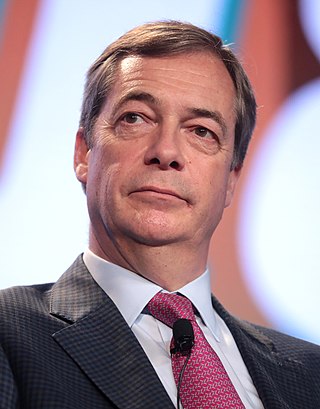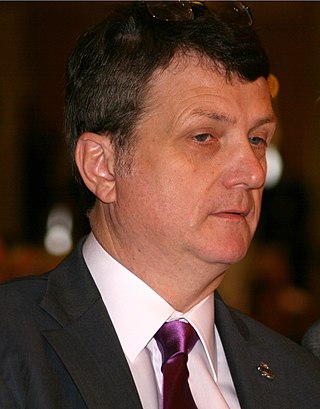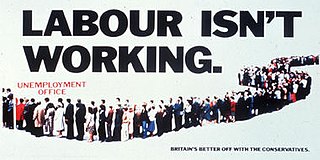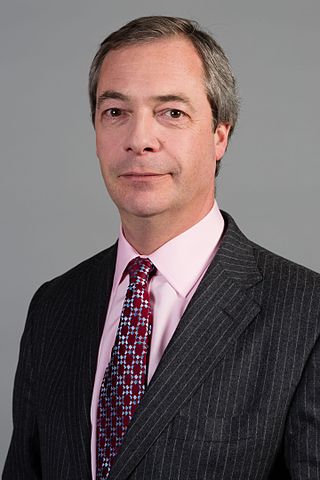
The UK Independence Party is a Eurosceptic, right-wing populist political party in the United Kingdom. The party reached its greatest level of success in the mid-2010s, when it gained two members of parliament and was the largest party representing the UK in the European Parliament. The party is currently led by Neil Hamilton.

The phrase "Middle England" is a socio-political term which generally refers to middle class or lower-middle class people in England who hold traditional conservative or right-wing views.

Nigel Paul Farage is a British broadcaster and former politician who was Leader of the UK Independence Party (UKIP) from 2006 to 2009 and 2010 to 2016 and Leader of the Brexit Party from 2019 to 2021. Farage is currently the Honorary President of Reform UK and a presenter for GB News. He served as Member of the European Parliament (MEP) for South East England from 1999 until the United Kingdom's exit from the European Union in 2020.

Gerard Joseph Batten is a British politician who served as the Leader of the UK Independence Party (UKIP) from 2018 to 2019. He was a founding member of the party in 1993, and served as a Member of the European Parliament (MEP) for London from 2004 to 2019.

Boston and Skegness is a county constituency, represented in the House of Commons of the UK Parliament. It is located in Lincolnshire, England. Like all British constituencies, Boston and Skegness elects one Member of Parliament (MP) by the first-past-the-post system of election. The seat has been represented by the Conservative MP Matt Warman since the 2015 general election, and is usually considered a safe seat for the party.

John Douglas Wilson Carswell is a British former politician who served as a Member of Parliament from 2005 to 2017, co-founded Vote Leave and currently serves as president and CEO of the Mississippi Center for Public Policy.

David Campbell Bannerman is a British Conservative Party politician who served as Member of the European Parliament (MEP) for the East of England from 2009 to 2019. He is currently Chairman of The Freedom Association. He served as Deputy Leader of UK Independence Party (UKIP) from 2006 until 2010, when he was replaced by Paul Nuttall.

Nicole Sinclaire is a British former politician who was leader of the We Demand a Referendum Party, and served as a Member of the European Parliament for the West Midlands from 2009 to 2014.

Paul Andrew Nuttall is a British politician who served as Leader of the UK Independence Party (UKIP) from 2016 to 2017. He was elected to the European Parliament in 2009 as a UK Independence Party (UKIP) candidate, and served as a Member of the European Parliament (MEP) for North West England between 2009 and 2019, sitting in the Europe of Freedom and Direct Democracy group. He left UKIP in December 2018, criticising the party's association with far-right activist Tommy Robinson, and joined The Brexit Party in 2019.

The 2014 European Parliament election was the United Kingdom's component of the 2014 European Parliament election, held on Thursday 22 May 2014, coinciding with the 2014 local elections in England and Northern Ireland. In total, 73 Members of the European Parliament were elected from the United Kingdom using proportional representation. England, Scotland and Wales use a closed-list party list system of PR, while Northern Ireland used the single transferable vote (STV).

"Labour Isn't Working" was an advertising campaign in the United Kingdom. It was run by the Conservative Party in 1978 in anticipation that Labour Party Prime Minister James Callaghan would call a general election. It was revived for the general election campaign the next year, after the government lost a vote of no confidence in the wake of the Winter of Discontent. It was designed by advertising agency Saatchi & Saatchi.

Diane Martine James is a British politician who was a Member of the European Parliament (MEP) for South East England from 2014 to 2019. She was briefly leader-elect of the UK Independence Party (UKIP) from September 2016 to October 2016, but resigned before formalising her leadership. At the time of her election to the European Parliament, James was one of three UKIP MEPs for South East England, before joining the Brexit Party in 2019.

Janice Ann Atkinson is a former British politician who was a Member of the European Parliament for the South East England region. She formerly represented the UK Independence Party (UKIP) and later sat as an independent: she was elected in 2014, second on the list for the region behind Nigel Farage. In March 2015, she was expelled from UKIP for "bringing the party into disrepute" after her chief of staff was recorded trying to fraudulently inflate her expenses.

Europe of Freedom and Direct Democracy was a Eurosceptic and populist political group in the European Parliament. The EFDD group was a continuation for the Eighth European Parliament of the Europe of Freedom and Democracy (EFD) group that existed during the Seventh European Parliament, with significant changes to group membership.

On 9 October 2014, a by-election was held for the UK parliamentary constituency of Clacton in Essex, England. The by-election was triggered by the Conservative MP for Clacton, Douglas Carswell, defecting to the UK Independence Party (UKIP) and subsequently resigning his seat to seek re-election as its candidate.
Arron Fraser Andrew Banks is a British businessman and political donor. He is the co-founder of the Leave.EU campaign. Banks was previously one of the largest donors to the UK Independence Party (UKIP) and helped Nigel Farage's campaign for Britain to leave the EU.
The 2015 United Kingdom general election debates were a series of four live television programmes featuring the leaders of seven main British parties that took place during the run-up to the general election. They each featured different formats and participants.

Grassroots Out (GO) was an organisation funded by Arron Banks that campaigned in favour of EU withdrawal in the 2016 referendum on EU membership in the United Kingdom. The organisation was formed in January 2016, as a result of infighting between Vote Leave and Leave.EU, and officially launched on 23 January 2016 in Kettering.

Nigel Farage is a former British MEP who has stood as a candidate representing eurosceptic parties UK Independence Party (UKIP) and The Brexit Party since 1994. He was a Member of the European Parliament representing South East England since the 1999 election, winning re-election four times. Farage has stood for election to the House of Commons seven times, in five general elections and two by-elections, losing in each by significant margins. He was also a proponent of the UK leaving the European Union in the 2016 referendum, in which the electorate voted to do so by 52% to 48%.

Reform UK is a right-wing populist political party in the United Kingdom. It was founded with support from Nigel Farage in November 2018 as the Brexit Party, advocating hard Euroscepticism and a no-deal Brexit and was a significant political force in the May 2019 European Parliament election but failed to win any seats in the 2019 UK general election. After Brexit, in January 2020, it was renamed to Reform UK and became primarily an anti-lockdown party during the COVID-19 pandemic. Subsequently, in December 2022, it began campaigning on broader right-wing populist themes during the British cost-of-living crisis.

















